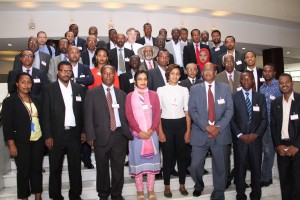The promising insights of growth in the IGAD member states on the one hand and a range of problems and challenges that these members states face on the other hand necessitated to have a platform where researchers, policy makers, development practitioners discuss and scrutinize the challenges, and contribute to the development endeavors in the region. Recognizing the importance of such a platform, The Horn Economic and Social Policy Institute (HESPI) along with its partners have initiated an annual conference for the IGAD Economies.
After successfully completing the first conference in 2014, the second conference on IGAD Economies was held from 29 – 30 October 2015 at the UNECA Conference Hall in Addis Ababa, Ethiopia. It was officially opened in the presence of H.E. Ato Ahmed Shide, State Minister of the Ministry of Finance and Economic Development of the Federal Democratic Republic of Ethiopia, and representatives from UNECA and ACBF.
The conference, which focused on Inclusive Growth and Poverty Reduction, had attracted more than 50 participants from different parts of the globe working at different capacities. More than 20 research papers were presented and discussed over the two days conference. The papers were mainly in the areas of Inclusive Growth; Agriculture and the Environment; Financial Inclusion; Market Potential and Productivity; and Private Sector and Inclusive Growth.
Moreover, along with research paper presentations, two panel discussions – one on IGAD Economies Transformation and Essential Pre-requisites; and second on Displacement and Migration in the IGAD Region – were held.
In the concluding remarks and way forward of the two days conference, participants expressed their satisfaction with the overall organization of the conference and appreciated its importance. They emphasized on the need for a forum of this type to bring together researchers in the IGAD region and elsewhere to discuss on pertinent issues of the sub-region, and suggested for continuity of the conference with a wider and diverse coverage in terms of both participants and quality and quantity of papers.

